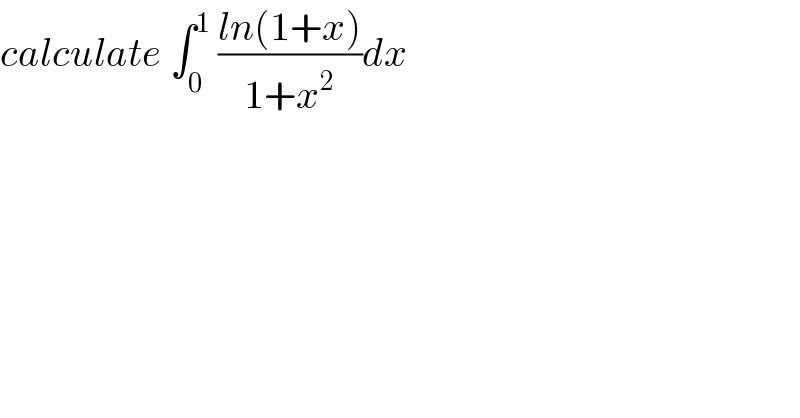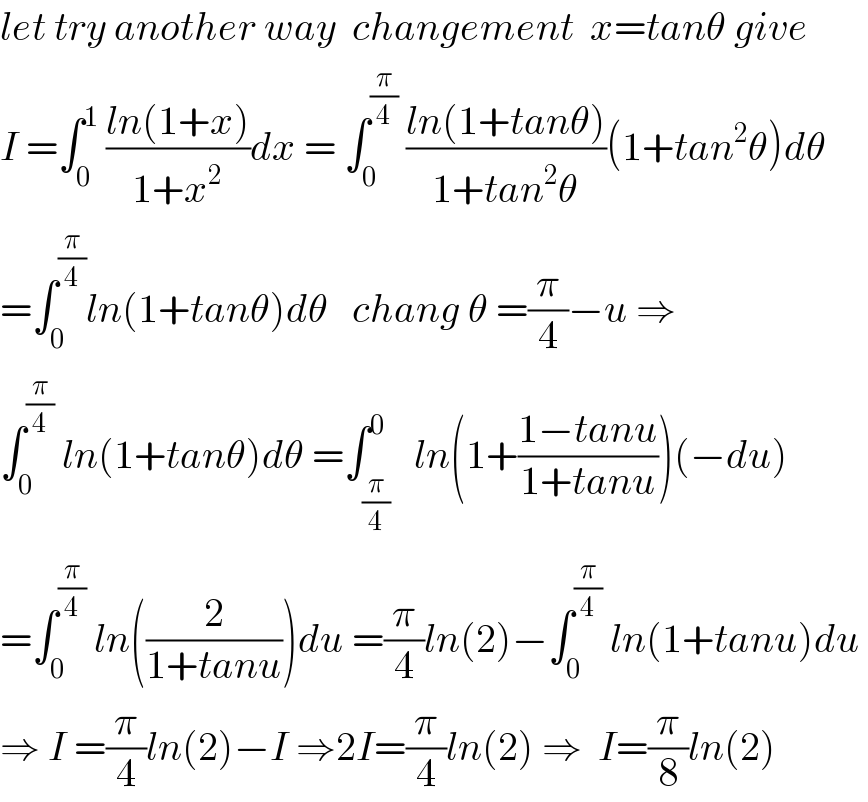
Question and Answers Forum
Question Number 64065 by mathmax by abdo last updated on 12/Jul/19

Commented by mathmax by abdo last updated on 13/Jul/19
![let f(t) =∫_0 ^1 ((ln(1+tx))/(1+x^2 ))dx with t>0 we have f^′ (t) =∫_0 ^1 (x/((1+tx)(1+x^2 ))) dx let decompose F(x) = (x/((tx+1)(x^2 +1))) ⇒F(x)=(a/(tx+1)) +((bx +c)/(x^2 +1)) a= lim_(x→−(1/t)) (tx+1)F(x)=((−1)/(t((1/t^2 )+1))) =((−t^2 )/(t(1+t^2 ))) =−(t/(t^2 +1)) lim_(x→+∞) xF(x) =0 =(a/t) +b ⇒b =−(a/t) =(1/(t^2 +1)) ⇒ F(x)=−(t/((t^2 +1)(tx+1))) +(((x/(t^2 +1)) +c)/(x^2 +1)) F(0) =0 =(t/(t^2 +1)) +c ⇒c=−(t/(t^2 +1)) ⇒ F(x)=(t/((t^2 +1)(tx+1))) +(1/(t^2 +1)) ((x−t)/(x^2 +1)) ⇒ f^′ (t)=∫_0 ^1 F(x)dx =(t/(t^2 +1)) ∫_0 ^1 (dx/(tx+1)) +(1/(t^2 +1)) ∫_0 ^1 ((x−t)/(x^2 +1)) dx =(t/(t^2 +1))(1/t)[ln(tx+1)]_0 ^1 +(1/(2(t^2 +1)))∫_0 ^1 ((2x)/(x^2 +1)) dx−(t/(t^2 +1)) ∫_0 ^1 (dx/(x^2 +1)) =((ln(t+1))/(t^2 +1)) +(1/(2(t^2 +1)))ln(2) −(t/(t^2 +1))(π/4) ⇒ f(t) =∫_0 ^t ((ln(1+u))/(u^2 +1))du+((ln(2))/2) ∫_0 ^t (du/(1+u^2 )) −(π/8) ∫_0 ^t ((2u)/(1+u^2 ))du +c =∫_0 ^t ((ln(1+u))/(1+u^2 )) +((ln(2))/2) arctan(t)−(π/8)ln(1+t^2 ) +c =∫_0 ^1 ((ln(1+tx))/(1+x^2 ))dx ...be continued...](Q64088.png)
Commented by mathmax by abdo last updated on 13/Jul/19

Commented by mathmax by abdo last updated on 14/Jul/19

